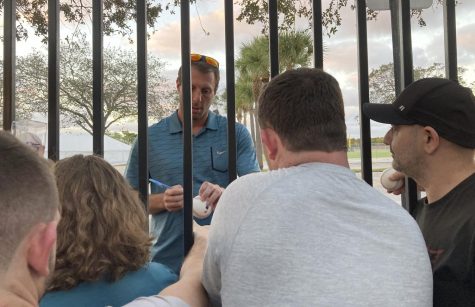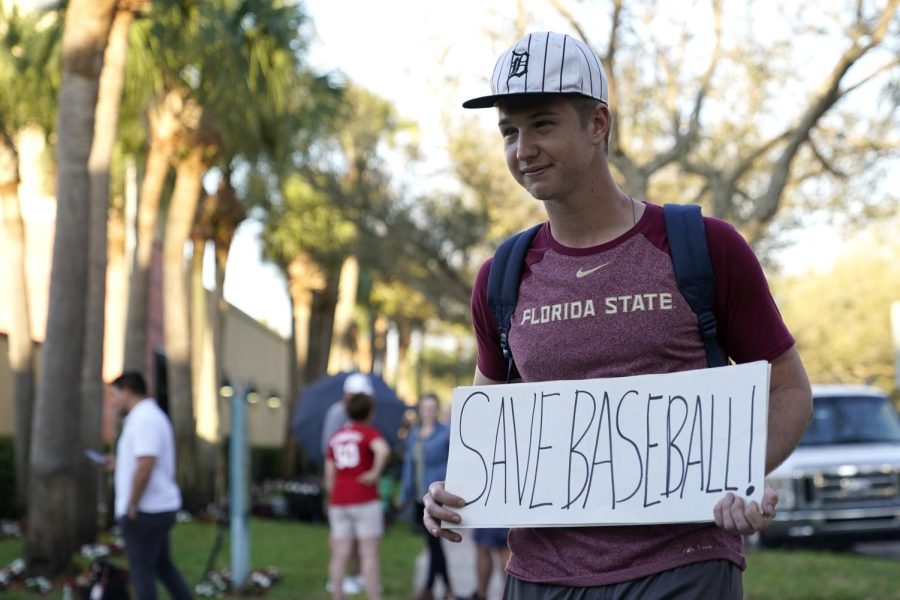Column | Regardless of lockout outcome, MLB owners and Manfred are tarnishing the game
Baseball fan Noah McMurrain stands outside of the Roger Dean Stadium in Jupiter, Florida, on Monday.
March 2, 2022
MLB commissioner Rob Manfred said just over two weeks ago that missing regular season games due to the current owner-imposed lockout would be “a disastrous outcome.”
With an optimistic tone, he announced his belief that the MLBPA and league’s owners would reach an agreement prior to the league-set deadline of Feb. 28. As the designated date drew nearer, the two parties appeared no closer to a conclusive agreement than they did on Dec. 2 — the day the lockout began.
There are a litany of issues the MLBPA and owners disagree upon, but the one causing the most unrest has been increasing both the minimum salary and the luxury tax.
Despite the league instituting the lockout in an attempt to speed up negotiations for the new collective bargaining agreement, they opened negotiations on Jan. 13 with their first proposal, 43 days after the lockout began.
The lack of punctuality seemed to demonstrate an absence of care and lack of eagerness from the owners to start the season on time. Also, the proposal didn’t please the players, further indicating that both sides were miles away from an agreement.
As opposed to the other major sporting organizations in the U.S., MLB doesn’t have a salary cap. This means that teams won’t be penalized for spending hundreds of millions of dollars while other teams operate with a relatively minuscule payroll.
Without backstory, no salary cap screams inequity — but there is a luxury tax to penalize organizations for spending inordinate amounts of money. Still, the tax hasn’t done much to deter teams with deep pockets from paying additional fees to acquire the best players.

(AP Photo/Ron Blum)
With the lockout, the extended disagreement has been perpetuated by small-market owners, who seem to be owners for the profit, not the competition. As their teams sink to irrelevancy and the bottom of division standings, they reel in profit from TV deals and other forms of income. Winning doesn’t seem to matter to these owners.
In his time as commissioner, Manfred has implemented numerous on-field changes. Implementing a universal designated hitter is the most pressing change under discussion during the lockout. While the on-field changes are mostly suggested by the players, Manfred and the owners seem to be using them as leverage against the players to get them to settle for less money in financial disagreements.
Perhaps the most notorious organization to take advantage of the “lose to profit” mantra are the Pittsburgh Pirates. Their total payroll of $54 million was the third lowest in baseball for the 2021 season, and the product on the field was a direct reflection of their spending. The team went 61-101, finishing only behind the Diamondbacks for the dubious distinction of being the worst team in the National League.
As Pirates owner Bob Nutting continually adds to his $1.3 billion net worth through lower payroll, fans continually cry inequity, but not directed at Nutting. Manfred and minority owners blame and penalize owners who spend their money — the ones who seem to care about winning over profit.
Manfred has created a massive void between players and owners — one that is finally coming to surface with the lockout. Players want to get paid, and the owners, particularly small-market ones, appear to refuse to pay money that they most certainly have.
Unfortunately, the unseen victims in this lockout are the fans. Die-hard supporters have for years unknowingly supported ownership that couldn’t seem to care less whether their favorite team is winning or losing.
While fans lament the lack of a salary cap and disparity between big-market and small-market teams, the owners sit smiling in their box office suites. Their payroll is significantly lower than the amount of money they’ve reeled in from loyal fans.
With the lockout, fans aren’t even getting the chance to support their owners. Baseball is at a complete standstill and seems to be heading that direction for the foreseeable future. In this standoff, fans must support the players — the argument of “billionaires fighting with millionaires” is a misnomer when you look at who really has the power in the relationship.
For fans demoralized and bored over the loss of spring training and winter meetings, there are other options.
College baseball this season should take center stage. So far during the MLB lockout, they’ve made the most of their new platform, providing fans with excitement and energy every game that rivals player expressions during game seven of the World Series. Across every conference are talented players who ought to usher in new waves of desperate fans looking for their fix of baseball.
Regardless of if the season resumes on time, professional baseball has deep-rooted issues that won’t be solved over one player-centric collective bargaining agreement. Owners, at the very least, have a moral obligation to their loyal fans to try and put the best possible product on the field to the extent of their financial capabilities.
Without the fans and the players, there is no baseball. It’s time for Manfred to realize that the inequity between parties has become too much for the sport to handle.








